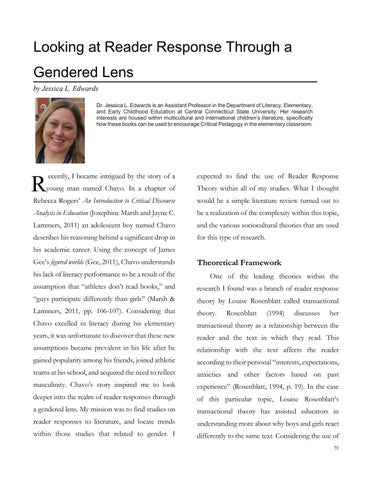5**F("2#&)#@.&9./#@.3<*"3.#>4/*=24#&# D."9./.9#5."3# by Jessica L. Edwards Dr. Jessica L. Edwards is an Assistant Professor in the Department of Literacy, Elementary, and Early Childhood Education at Central Connecticut State University. Her research interests are housed within multicultural and international children’s literature, specifically how these books can be used to encourage Critical Pedagogy in the elementary classroom. ! ! !
' !
R
ecently, I became intrigued by the story of a
expected to find the use of Reader Response
young man named Chavo. In a chapter of
Theory within all of my studies. What I thought
Rebecca Rogers’ An Introduction to Critical Discourse
would be a simple literature review turned out to
Analysis in Education (Josephine Marsh and Jayne C.
be a realization of the complexity within this topic,
Lammers, 2011) an adolescent boy named Chavo
and the various sociocultural theories that are used
describes his reasoning behind a significant drop in
for this type of research.
his academic career. Using the concept of James Gee’s figured worlds (Gee, 2011), Chavo understands
Theoretical Framework
his lack of literacy performance to be a result of the
One of the leading theories within the
assumption that “athletes don’t read books,” and
research I found was a branch of reader response
“guys participate differently than girls” (Marsh &
theory by Louise Rosenblatt called transactional
Lammers, 2011, pp. 106-107). Considering that
theory.
Chavo excelled in literacy during his elementary
transactional theory as a relationship between the
years, it was unfortunate to discover that these new
reader and the text in which they read. This
assumptions became prevalent in his life after he
relationship with the text affects the reader
gained popularity among his friends, joined athletic
according to their personal “interests, expectations,
teams at his school, and acquired the need to reflect
anxieties and other factors based on past
masculinity. Chavo’s story inspired me to look
experience” (Rosenblatt, 1994, p. 19). In the case
deeper into the realm of reader responses through
of this particular topic, Louise Rosenblatt’s
a gendered lens. My mission was to find studies on
transactional theory has assisted educators in
reader responses to literature, and locate trends
understanding more about why boys and girls react
within those studies that related to gender. I
differently to the same text. Considering the use of
Rosenblatt
(1994)
discusses
her
39





